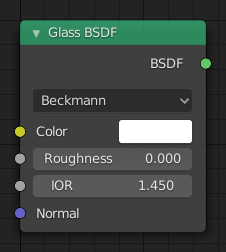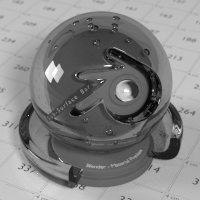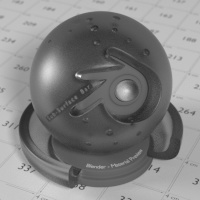Glass BSDF¶

Glass BSDF.¶
The Glass BSDF is used to add a Glass-like shader mixing refraction and reflection at grazing angles. Like the transparent shader, only pure white will make it transparent. The glass shader tends to cause noise due to caustics. Since the Cycles path tracing integrator is not very good at rendering caustics, it helps to combine this with a transparent shader for shadows; for more details see here.
Entradas¶
- Color
Color of the surface, or physically speaking, the probability that light is transmitted for each wavelength.
- Roughness (Rugosidad)
Influences sharpness of the refraction; perfectly sharp at 0.0 and smoother with higher values.
- IOR
Index of refraction (IOR) defining how much the ray changes direction. At 1. 0 rays pass straight through like transparent; higher values give more refraction.
- Normal
Normal used for shading.
Propiedades¶
- Distribution
Microfacet distribution to use.
- Definido
Results in perfectly sharp reflections like a mirror. The Roughness value is not used.
- GGX
GGX microfacet distribution.
- Multiple-scattering GGX
Cycles Only Takes multiple bounce (scattering) events between microfacets into account. This gives a more energy conserving results, which would otherwise be visible as excessive darkening.
- Beckmann
Cycles Only Beckmann microfacet distribution.
- Ashikhmin-Shirley
Cycles Only Ashikhmin-Shirley microfacet distribution.
Salidas¶
- BSDF
Salida estándar de shader.

